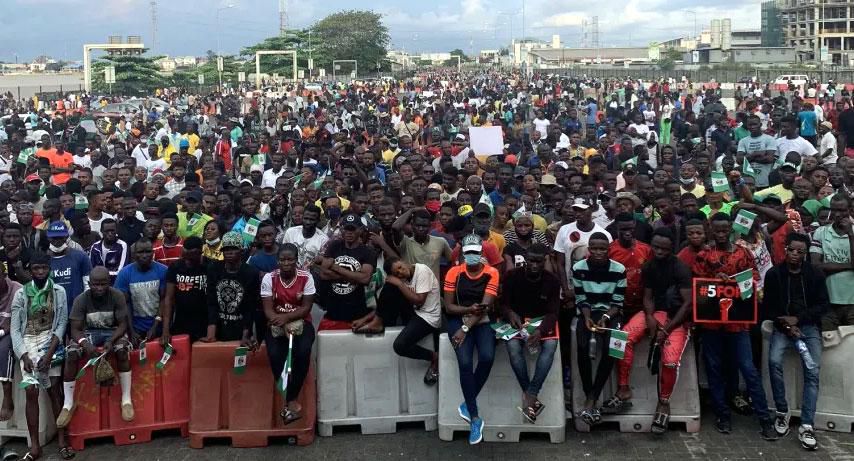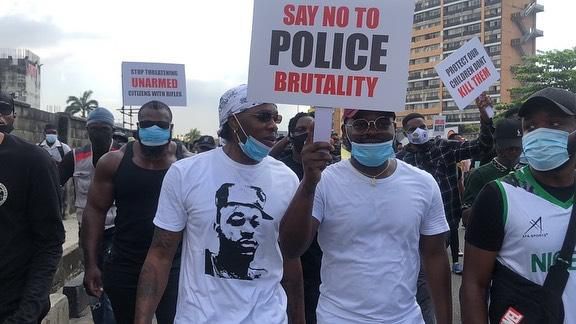How the #EndSARS movement influenced digital activism in Nigeria
![The Nigerian youth spoke out during the #EndSARS campaign in October 2020 [Rest of World]](https://image.api.sportal365.com/process/smp-images-production/pulse.ng/26072024/a9656e83-f7b4-4ca7-895d-8f0d8a60feee?operations=autocrop(700:467))
In the wake of the #EndSARS movement, Nigeria found itself amidst a digital revolution, where the sparks of online protest accentuated the spirit of digital activism in Nigerian youth after years of bottled-up anger on the activities of a notorious police unit called SARS.
Like wildfire, the movement spread through the vast expanse of social media, igniting a powerful beacon of change and illuminating the path for a new era of digital advocacy.
Pushing the #EndSARS campaign on all social media platforms, with relevant hashtags, countless images and videos amplifying their messages, Nigerian youths mobilised themselves all over the country and shut down city centres until the Federal Government responded to their demands.
Unfortunately, the struggle tragically peaked on the night of Tuesday, October 20, 2022, when the government deployed soldiers in Lagos to disperse the protesting youth at the Lekki tollgate with gunshots that consequently fired up young Nigerians’ passion for political activism.

It’s been three years since the ominous echoes of gunfire attempted to shut the voices of the youth. The #EndSARS events, etched in the collective heart and memory of the nation, continue to cast profound shadows over the discourse surrounding governmental affairs, as the impact of the movement continues to resonate in political conversations and comments on social media, serving as a solemn reminder of a resilient spirit that refuses to be silenced.
Looking back at the successes of the #EndSARS movement despite COVID-19 restrictions, Olu Onemola, a former Special Assistant at the Nigerian National Assembly, told Pulse, “The #ENDSARS movement demonstrated to young Nigerians that, with just their phones and laptops, they could effectively organise towards predetermined goals.”
Even though the movement was tagged ‘headless’ because it had no central leadership, Onemola reckoned the youth succeeded in creating a sense of community using digital channels to create global awareness about the causes they were fighting for.

“The sense of community created using digital channels and platforms made everyone involved realise that they were not alone. It also facilitated breaking down the struggle into structures. For example, organic logistics structures were formed out of necessity, alongside structures for first aid, healthcare, security, legal issues, and so forth,” he submitted.
On the contrary, award-winning journalist and team lead of Platforms Africa, Adeola Yusuf, attributed the success of the #EndSARS campaigns to the preexisting digital journalism and activism among the youth.
“I think it is actually digital journalism that influenced the #EndSARSs movement. You will agree with me that before the movement, we had some sort of digital activism, we had on two occasions at the University of Lagos when student unions protested against the government, mobilising themselves through WhatsApp. I am also aware that through citizenship journalism, some materials were shared. Those materials shaped the perspective of the people and they later acted on what they received,” Yusuf submitted.
While the #EndSARS movement largely sought a finality to the existence of SARS and the unprofessional conduct of its officials, the central motivation of many Nigerians for joining the campaign according to Onemola was more about, “This is not the kind of country I want my children to grow up in.”
Social media, especially Twitter, now known as X, played a significant role in pushing #EndSARS narratives and mobilising the youth for the cause. The social media platform solidarised with the youth by creating a dedicated emoji to represent and amplify the campaign.
![Twitter now X created an emoji to amplify the #EndSARS campaign. [Royal Times of Nigeria]](https://image.api.sportal365.com/process/smp-images-production/pulse.ng/26072024/5e04a64f-f49e-4a93-bbeb-3a68e877d4ef)
“Without social media, the EndSARS movement would not have been possible. The spark that started the movement would not have trended, the initial efforts to organise would not have happened, and the disruption of the first small pockets of protests by the police would not have been captured,” Onemola said.
Apart from the fact the movement was inspired by the youth, Twitter’s move to tacitly plug into the campaign spoke volumes about its quest for relevance among the demographic that finds it veritable for political comments.
Whether Twitter endorsed the movement or not, the youths would still have used it as the main tool to promote their cause because according to Yusuf, “The #EndSARS movement belongs to the youth and one would normally expect the youth to use the instrument they have to push their narratives.”
In his opinion, Onemola said, “The use of social media helped to push the narrative that galvanised a resolute generation into action in a way that was never seen or expected in Nigeria.”
Also, the government’s reaction to the movement played a significant role in awakening the political awareness of the youth post-EndSARS.
“Initially, the government’s response to the protests was to use force. Then there was confusion. Then there were efforts at dialogue. But before long, the government was using force again.
“I think the people in government must always think outside the box and beyond the boundaries of the old ways of doing things. When people are protesting, it’s not always about you. Sometimes, chaos is a ladder to get them to your side,” Onemola said.
He believes if the government had shown responsiveness, by engaging the protesting youth and addressing their concerns, it wouldn’t have needed to crack down on peaceful protesters.
![The youth gathered at Lekki tollgate to demand the disbandment of SARS [Guardian]](https://image.api.sportal365.com/process/smp-images-production/pulse.ng/26072024/9284d0a5-b73e-4b75-a29f-4dc3eaab7892)
However, in his analysis of the government’s reaction, Yusuf maintained that the response of the Lagos State Government to the #EndSARS protests should not be lumped with that of the Federal Government.
“At the initial stage, the Governor of Lagos State, Babajide Sanwo-Olu, joined the protest to address the protesters but later the protest gained momentum, and protesters gathered at the Lekki toll gate, Okota, Cele, and Ikeja. So, when that became a headache based on the information received, the Lagos State Government had to react when the protesters started blocking roads. A lot of people complained about that.
“The other part is the reaction of the Federal Government which controls the Nigerian Army that was sent to intervene in the crisis. Basically, the two governments reacted but their reactions did not go down well with the youths,” the journalist submitted.
Onemola said the long-term impact of the #EndSARS movement may not be clear yet, but its success resonated with the popularity the Labour Party (LP) enjoyed in the 2023 general elections. This, according to him, suggested that digital organisation can be effective, especially when it taps into the youth demographic.
While the #EndSARS movement didn’t accomplish all its goals with the Federal Government, it did achieve its main objective: the dissolution of the infamous SARS and compensation for some of its victims.
Additionally, the movement taught the governments, both state and federal, a crucial lesson on the need to be receptive and responsive to the concerns and demands of young Nigerians on social media platforms.
In conclusion, the #EndSARS movement is a testament to the resilience of the generation that is unafraid to ‘soro soke’ and demand change. The movement succeeded in empowering a new generation of citizens who are unyielding in their determination to hold the government accountable.
)
![Aisha blows hot on Security forces; Y7ou won't believe what she said [VIDEO]](https://image.api.sportal365.com/process/smp-images-production/pulse.ng/17082024/1f976edf-1ee2-4644-8ba1-7b52359e1a8f?operations=autocrop(640:427))
)
)
)
![Lagos state Governor, Babajide Sanwo-Olu visited the Infectious Disease Hospital in Yaba where the Coronavirus index patient is being managed. [Twitter/@jidesanwoolu]](https://image.api.sportal365.com/process/smp-images-production/pulse.ng/16082024/377b73a6-190e-4c77-b687-ca4cb1ee7489?operations=autocrop(236:157))
)
)
)
)
)
)
)
)
)
)
)